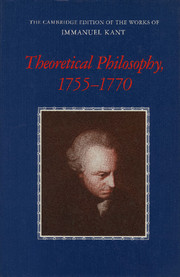Book contents
- Frontmatter
- Contents
- General editors' preface
- Preface
- Guide to abbreviations
- General introduction
- Introductions to the translations
- Résumés of the works
- A NEW ELUCIDATION OF THE FIRST PRINCIPLES OF METAPHYSICAL COGNITION (1755)
- THE EMPLOYMENT IN NATURAL PHILOSOPHY OF METAPHYSICS COMBINED WITH GEOMETRY, OF WHICH SAMPLE I CONTAINS THE PHYSICAL MONADOLOGY (1756)
- AN ATTEMPT AT SOME REFLECTIONS ON OPTIMISM (1759)
- THE FALSE SUBTLETY OF THE FOUR SYLLOGISTIC FIGURES (1762)
- THE ONLY POSSIBLE ARGUMENT IN SUPPORT OF A DEMONSTRATION OF THE EXISTENCE OF GOD (1763)
- ATTEMPT TO INTRODUCE THE CONCEPT OF NEGATIVE MAGNITUDES INTO PHILOSOPHY (1763)
- Preface
- Section 1 Elucidation of the concept of negative magnitudes in general
- Section 2 In which philosophical examples embodying the concept of negative magnitudes are adduced
- Section 3 Containing some reflections which may serve to prepare the application of the above concept to the objects of philosophy
- INQUIRY CONCERNING THE DISTINCTNESS OF THE PRINCIPLES OF NATURAL THEOLOGY AND MORALITY (1764)
- M. IMMANUEL KANT'S ANNOUNCEMENT OF THE PROGRAMME OF HIS LECTURES FOR THE WINTER SEMESTER 1765 — 1766 (1765)
- DREAMS OF A SPIRIT-SEER ELUCIDATED BY DREAMS OF METAPHYSICS (1766)
- CONCERNING THE ULTIMATE GROUND OF THE DIFFERENTIATION OF DIRECTIONS IN SPACE (1768)
- ON THE FORM AND PRINCIPLES OF THE SENSIBLE AND THE INTELLIGIBLE WORLD [INAUGURAL DISSERTATION] (1770)
- Factual notes
- Bibliographies of editions and translations
- Glossary
- Biographical-bibliographical sketches of persons mentioned by Kant
- Index
Section 3 - Containing some reflections which may serve to prepare the application of the above concept to the objects of philosophy
Published online by Cambridge University Press: 18 December 2014
- Frontmatter
- Contents
- General editors' preface
- Preface
- Guide to abbreviations
- General introduction
- Introductions to the translations
- Résumés of the works
- A NEW ELUCIDATION OF THE FIRST PRINCIPLES OF METAPHYSICAL COGNITION (1755)
- THE EMPLOYMENT IN NATURAL PHILOSOPHY OF METAPHYSICS COMBINED WITH GEOMETRY, OF WHICH SAMPLE I CONTAINS THE PHYSICAL MONADOLOGY (1756)
- AN ATTEMPT AT SOME REFLECTIONS ON OPTIMISM (1759)
- THE FALSE SUBTLETY OF THE FOUR SYLLOGISTIC FIGURES (1762)
- THE ONLY POSSIBLE ARGUMENT IN SUPPORT OF A DEMONSTRATION OF THE EXISTENCE OF GOD (1763)
- ATTEMPT TO INTRODUCE THE CONCEPT OF NEGATIVE MAGNITUDES INTO PHILOSOPHY (1763)
- Preface
- Section 1 Elucidation of the concept of negative magnitudes in general
- Section 2 In which philosophical examples embodying the concept of negative magnitudes are adduced
- Section 3 Containing some reflections which may serve to prepare the application of the above concept to the objects of philosophy
- INQUIRY CONCERNING THE DISTINCTNESS OF THE PRINCIPLES OF NATURAL THEOLOGY AND MORALITY (1764)
- M. IMMANUEL KANT'S ANNOUNCEMENT OF THE PROGRAMME OF HIS LECTURES FOR THE WINTER SEMESTER 1765 — 1766 (1765)
- DREAMS OF A SPIRIT-SEER ELUCIDATED BY DREAMS OF METAPHYSICS (1766)
- CONCERNING THE ULTIMATE GROUND OF THE DIFFERENTIATION OF DIRECTIONS IN SPACE (1768)
- ON THE FORM AND PRINCIPLES OF THE SENSIBLE AND THE INTELLIGIBLE WORLD [INAUGURAL DISSERTATION] (1770)
- Factual notes
- Bibliographies of editions and translations
- Glossary
- Biographical-bibliographical sketches of persons mentioned by Kant
- Index
Summary
What I have said so far merely amounts to a preliminary examination of an object? which is as important as it is difficult. In advancing to general principles from the examples which have been introduced and which are easy enough to understand, there are good grounds for extreme concern: in pursuing this untrodden path mistakes may be made which only come to be noticed as one advances. Accordingly, what I have yet to say on the matter is to be regarded as an experiment which is very imperfect. And yet it is my expectation that any attention, which may be paid to it, will be beneficial in a variety of different ways. I am fully aware that an admission of this kind is a very poor sort of recommendation to those who demand an assertive and dogmatic tone, if they are to permit themselves to be steered in the desired direction. I do not feel the least regret at losing this kind of acclaim. It seems to me, however, that, in a branch of knowledge as difficult to handle as metaphysics, it is much more appropriate that one's thought should first of all be presented to public examination in the guise of tentative experiments than that they should be announced from the beginning with all the adornments of pretended thoroughness and complete conviction. It commonly happens with that latter course that all improvement is rejected out of hand, and any weakness which may be found in what one has to say becomes incurable.
1. Anybody can easily understand why something does not exist, when the positive ground for its existence is lacking. But how that which exists should cease to be – that is not so easy to understand. There exists at this moment in my soul, for example, the representation of the sun, and it exists in virtue of the power of my imagination. The next moment, I cease to think of this object.
Information
- Type
- Chapter
- Information
- Theoretical Philosophy, 1755–1770 , pp. 227 - 242Publisher: Cambridge University PressPrint publication year: 1992
